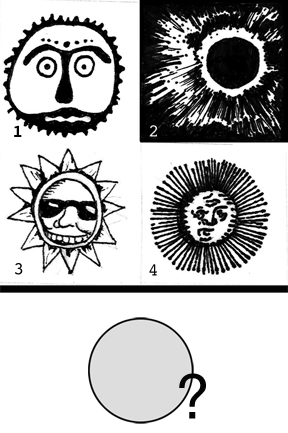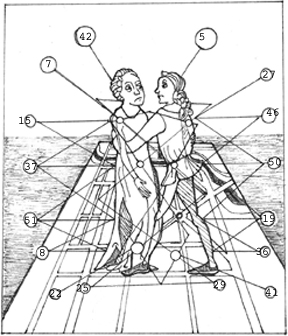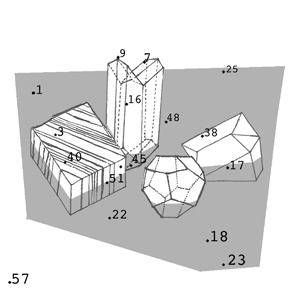IssuesArt ProjectsCritical ConversationsLecturesJournal PressContactHome
issue guide
#10 intro
Key
Points of interest
Essays
2 non-maps
Masthead
Key
Throughout this non cartography, the points of interest a suggest:
(Note: Though the numbers in these graphs below seem to refer to particualr artistic projects in our points of interest <jump> and on the following pages,they are just randomly selected nummbers. Readers are invited to map where for themselves how each project relates to these cartographic concepts.)
(Note: Jump to our points of interest) <Jump>
totems (A)
totems refer to the what? that both the idea and its object communicates (they may differ).
humors(B)
humors refer to the how, the technical ways in which things emotionally and physically engage and facilitate relation.
tectonics (C)
tectonics are the economic, conceptual, geographical (etc) contexts that whatever project is imbedded within and help define their origin and frame.
Key: A non-Cartography of Power
Climate Change will sensibly rearrange everything.
--
On the fact of a changing climate, this issue overlooks the discourse, measurements,
judgements of
the anthropocene, capitalocene, chuthulucene, etc. Rather, its curatorial
work begins by squarely
encountering the necessary reorganization of life’s relationality
suggested by what will be undone
and remade in this scenario.
Our approach has three basic precepts:
1) The changing climate appears in the transformation
and rupture of human and non-human
routines, whether or not science and government
recognize them. Life makes do, however.
2) These ruptures will demand yet unknowable
reorganizations of the ways of being and relating
in
and to the world.
3) The creative and insurgent responses to power’s unequal ethic
that have been discussed in this journal
since our
inception (those ofcapitalism, racisms,
sexisms, etc..) continue with more specific
detail, despite
the unknowable future to be made by climate change.
Between propositions 2 and 3 appears a way that relations should not be considered; promethean and accelerationist re-organizations attendant to capitalistist/state-socialist social reproduction ignore organizational ethics that build human capacities besides accumulation and strict bio-social regimentation. Other human futures are possible besides strict order and production. We look to each submitted project to the extent that they facilitate such transformations.
These precepts underly our curatorial choice to neither order nor prioritize any open one call submission that we recieved. We trust people’s knowledge within particular contexts and situations to recognize appropriate techniques and ways to make human their relations (until they don’t). After blaming capital, this issue affirms that meaningful cartographies are elsewhere and best understood in commited engagement with actually caring about the particulars of the world.
Submissions are hand-written to demonstrate the curatorial thought regarding context, intended meaning or use, mediatic afterlife as idea and form, that each project editorially recieved.
Neither our lack of presentational order or the hand-drawn ethic of this issue isn’t a retreat from what’s been historically understood as ‘universal’ concepts like “human rights” and “economic justice” that often order things. But, inspired by Denise Ferreira da Silva we want this issue to instigate conceptual praxis that thinks differently about questions that seem to have universal answers; Western modernity’s particular logic of universal equivalences of value has gotten us into this mess, there must be another way out. We hope to demonstrate this by showing consideration for each project’s particularity instead of judging what fits where and what doesn’t.


